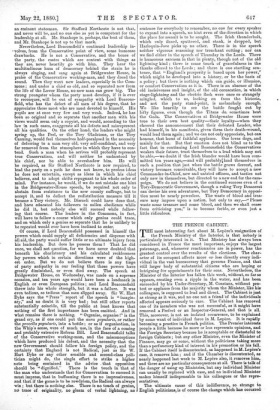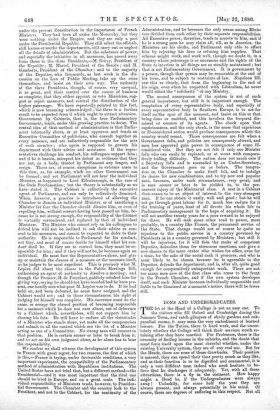THE FRENCH CABINET.
THE most interesting fact about M. Lepere's resignation of the French Ministry of the Interior, is that nobody is particularly interested in it. That Ministry has always been considered in France the most important, enjoys- the largest patronage, and, whenever reactionaries are in power, has the greatest control over the results of the elections. The char- acter of its occupant affects more or less directly every indi- vidual in the vast bureaucracy that governs France, and that Still larger body of substantial citizens who are hoping or intriguing for appointments for their eons. Nevertheless, the Minister of the Interior has fallen this week, without, so fares appears, creating even a ripple in the water, and has been succeeded by his Under-Secretary, M. Constans, without pro- test or applause from the majority whom the Minister, like his colleagues, is supposed to lead and direct. The Cabinet is just as strong as it was, and no one not a friend of the individuals affected appears seriously to care. The Cabinet has removed one of its members who was not successful, as it might have removed a Prefect or an Inspector-General, and that is all. This, moreover, is not an isolated occurrence, to be explained by some want of individual force in M. Lepere. It is rapidly becoming a practice in French politics. The Premier intereete people a little because he more or less represents opinions, and the Foreign Secretary because he is acceptable or distasteful to foreign Cabinets ; but any other Minister, even the Minister of Finance, may go or come, without the politicians taking more than a perfunctory kind of interest in his promotion or his fall. If the Cabinet itself is discontented, as happened in M. Lepere's case, it removes him ; and if the Chamber is discontented, as nearly happened last week to M. Lepere also, it removes him, and there are no particular consequences at all. There is talk of the danger of using up Ministries, but any individual Minister can usually be replaced with ease, and no individual Minister makes himself indispensable to his colleagues or the repre- sentatives.
The ultimate cause of this indifference, so strange to English politicians, is of course the change which has Occurred •
under the present Constitution in the importance of French Ministers. They had been all under the Monarchy, but they were nothing under the Empire, and they are only a part under the Presidential Republic. They still select the officials, still harass or soothe the departments, still carry out or neglect all the details of administration. But the substance of power, and especially the initiative in all measures, has passed away from them to the three Presidents,—M. Grevy, President of the Republic ; M. Martel, President of the Senate ; and M. Gambetta, President of the Chamber ; and to the majority of the Deputies, who frequently, as last week in the dis-
cussion on the Law of Public Meeting, take up the reins themselves, and insist on their own way. The authority of the three Presidents, though, of course, very unequal, is so great, and their control over the course of business so complete, that they either appoint or veto Ministries, sug- gest or reject- measures, and control the distribution of the higher patronage. We have repeatedly pointed to this fact, which is now becoming acknowledged ; but there is a further result to be expected from it which ought to attract attention. Government by Cabinets, that is, the true Parliamentary Government, tends, under this growing practice, to decay. The central idea of that method of administration is that Parlia- ment informally elects, or at least approves and trusts an Executive Committee of politicians, who consult together on every measure, and are collectively responsible for the acts of each member ; who again is supposed to govern his department with their advice and assistance. If the repre- sentatives challenge his conduct, his colleagues support him ; and if he is beaten, interpret his defeat as evidence that they are not, as a body, trusted by Parliament any longer, and resign. There are, of course, exceptions in extreme cases to this view, as, for example, whet no other Government can be formed ; and yet Parliament will not bear the individual Minister, as happened to Lord Ellenborough, in the case of the Oude Proclamation ; but the theory is substantially as we have• stated it. The Cabinet is collectively the executive agent of Parliament, and can only be collectively dismissed. When, however, a practice is introduced of allowing the Chamber to dismiss an individual Minister, or of sacrificing a Minister for fear the Chamber should dismiss him, or even of expelling him, without censure having been passed on him, be- cause he is not strong enough, the responsibility of the Cabinet is virtually surrendered, and replaced by that of individual Ministers. The Minister who cannot rely on his colleagues to defend him will not be inclined to ask their advice or con- :sent to his measures, and cannot be expected to defer to their authority. He is responsible to Parliament for his conduct, not they, and must of course decide for himself what his con- duct shall be. If they are to control him, they must be re- sponsible for him ; and if they will not be, he'becomes again an individual. He must face the Representatives alone, and give up or maintain the clauses of a measure or the measure itself, as he judges to be most expedient. This is precisely what M. Lepere did about the clause in the Public Meetings Bill, authorising an agent of authority to dissolve a meeting ; and though the Premier, M. de Freycinet, publicly rebuked him for giving way, saying he should not have receded had he been pre- sent, one hardly sees what poor M. Lepere was to do. If he had held on, and been defeated, he must have resigned, and the Cabinet would not ; and in those circumstances, his right of judging for himself was complete. His successor must do the same, or occupy the absurd position of becoming responsible for a measure which he does not care about, out of deference to a Cabinet which, nevertheless, will not support him by -sharing his fate. He will have to endure all the vicissitudes of a Minister who stands alone, yet make all the compromises -and submit to all the control which are the lot of a Minister acting as one of a Committee. No strong man will consent to that position. He is certain sooner or later to break from it, and to act on his own judgment alone, as he alone has to bear the responsibility.
We confess we shall witness the development of this system in France with great regret, for two reasons, the first of which is this,—France is trying, under favourable conditions. a very important experiment, the compatibility of the Parliamentary method of administration with Republican institutions. The United States have not tried that, but a different method—the Presidential—and it was most important that the rival one should be tried in Europe, and on a great scale. The indi- vidual responsibility nf Ministers tends, however, to Presiden- tial Government. The Chamber and the country look to the President, and not to the Cabinet, for the continuity of the Administration, and he becomes the only nexus among Minis- ters divided from each other by their separate responsibilities. All Executive power, therefore, tends to accrete to him, and if he is a strong man he may claim all, till, as in America, the Ministers are his clerks, and Parliament only able to affect him by rejecting his laws or refusing him supplies. That scheme might work, and work well, though we doubt it, in a country where patronage is so enormous and the rights of the State to interfere in all things are so steadily maintained ; but that is not Parliamentary Government. It is government by a person, though that person may be removable at the end of his term, and be subject to restraints of law. Napoleon III. saw this 80 clearly, that from the beginning to the end of his reign, even when he coquetted with Liberalism, he never would admit the "solidarite " of any Ministry.
The second consequence of the system is not of such general importance, but still it is important enough. The temptation of every representative body, and especially of every representative body in Southern Europe, is to act for itself on■the spur of the moment, and insist on this or that being done or omitted, and this involves the frequent dis- missal or censure of its agents. The check upon that capriciousness, and the only check, is the sense that capricious or ill-considered action would produce consequences which the country would resent. Those consequences are felt when a Government falls, and policies are consequently altered, and men less approved gain power in consequence of some ill- considered vote. But they are not felt if only one Minister falls who can easily be replaced, or at worst with compara- tively trifling difficulty. The nation does not much care if a Secretary falls and is succeeded by an Under-Secretary, and the Government goes on as before. The tempta- tion on the Chamber to make itself felt, and to indulge its desire for new combinations, and to try new and popular men, becomes, under such circumstances, -very great, and is sure sooner or later to be yielded to, to the per- manent injury of the Ministerial class. A seat in a Cabinet then ceases to be an object of interest to the very strongest man. If he can obtain it easily, well and good ; but he will not go through great labour for it, much less endure for it the training of years, least of all devote his whole life to Parliamentary management in the hope of acquiring it. He will not sacrifice twenty years for a poor reward to be enjoyed for three. He will seek some other road to power, most probably, in a country like France, the permanent service of the State. That change would not of course be quite so injurious to the public service in a country governed by Presidents as. in a country governed by Ministers ; but still it will be injurious, for it will thin the ranks of competent Deputies, disincline them for strenuous exertions, and give a new chance to the mere orator who wishes for office, even for a time, for the sake of the social rank it procures, and who is most likely to be chosen because he is agreeable to the Deputies, defends the department, and is, after all, quite good enough for comparatively unimportant work. There are not too many men now of the first class who come to the front in the French Chamber, and if the new system developes itself, and each Minister becomes individually responsible and liable to be dismissed at a moment's notice, there will be fewer still.



































 Previous page
Previous page